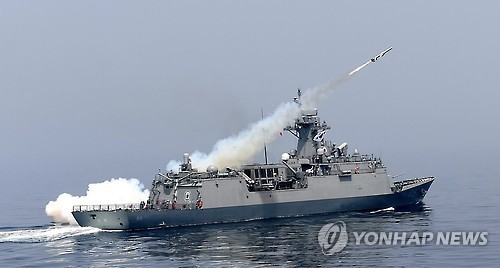Lawmakers question capability of military equipment
By Yoon Min-sikPublished : Sept. 25, 2016 - 16:48
South Korean lawmakers on Sunday raised concerns over the proficiency of the country’s aged computerized command and control system as well as guided missile systems that showed poor accuracy in test launches.
Rep. Kim Jin-pyo of the main opposition The Minjoo Party of Korea said Defense Ministry data showed the accuracy of the military’s guided missiles in launches had dropped from 94.4 percent in 2014 to 55.6 percent this year.
Only five of the nine weapons test-fired this year struck the intended target, as opposed to 17 of 18 in 2014 and 10 of 11 last year.
More specifically, the homegrown SSM-700K Haeseong anti-ship cruise missile plunged before reaching the intended target during a May drill.
Rep. Kim Jin-pyo of the main opposition The Minjoo Party of Korea said Defense Ministry data showed the accuracy of the military’s guided missiles in launches had dropped from 94.4 percent in 2014 to 55.6 percent this year.
Only five of the nine weapons test-fired this year struck the intended target, as opposed to 17 of 18 in 2014 and 10 of 11 last year.
More specifically, the homegrown SSM-700K Haeseong anti-ship cruise missile plunged before reaching the intended target during a May drill.

During the July Rim of the Pacific exercise, one of two RIM-66 missiles fired from the Aegis-equipped destroyer King Sejong the Great missed its mark. The drill was the first time the Navy had attempted an automated interception of a multiple threat.
Rep. Kim said that the overall stability of the guided missile system needs to be inspected and reaffirmed, while urging the government for an extra budget to ensure that the military is combat-ready.
In addition to the weapons themselves, the proficiency of the military’s computers was also questioned.
According to Rep. Kim Jong-dae of the minor opposition Justice Party, most of the South Korean Army’s devices for its C4I -- command, control, communications, computer and intelligence -- systems have exceeded their standard life span.
Out of 499 Army tactical C4I intelligence system servers, 492 were used for over six years, which is the machines’ standard life span within the military. All of the 1,600 items of networking hardware exceeded their seven-year life span, while 3,139 of 9,174 Army laptops had been in use for more than the recommended six years.
“It was learned that the aged equipment had caused hindrance in information sharing during war games, and even caused the server to crash altogether,” said Rep. Kim in a press release.
The Army is slated to replace the outdated ATCIS servers starting from 2018, but this would mean that some servers would be used for up to 16 years until the project is completed in 2022.
The issue of aging equipment was common throughout the military, Kim’s data implied, as 47 percent of the Joint Chiefs of Staff’s Korean joint command and control system’s networking hardware was used for over seven years.
By Yoon Min-sik (minsikyoon@heraldcorp.com)
Rep. Kim said that the overall stability of the guided missile system needs to be inspected and reaffirmed, while urging the government for an extra budget to ensure that the military is combat-ready.
In addition to the weapons themselves, the proficiency of the military’s computers was also questioned.
According to Rep. Kim Jong-dae of the minor opposition Justice Party, most of the South Korean Army’s devices for its C4I -- command, control, communications, computer and intelligence -- systems have exceeded their standard life span.
Out of 499 Army tactical C4I intelligence system servers, 492 were used for over six years, which is the machines’ standard life span within the military. All of the 1,600 items of networking hardware exceeded their seven-year life span, while 3,139 of 9,174 Army laptops had been in use for more than the recommended six years.
“It was learned that the aged equipment had caused hindrance in information sharing during war games, and even caused the server to crash altogether,” said Rep. Kim in a press release.
The Army is slated to replace the outdated ATCIS servers starting from 2018, but this would mean that some servers would be used for up to 16 years until the project is completed in 2022.
The issue of aging equipment was common throughout the military, Kim’s data implied, as 47 percent of the Joint Chiefs of Staff’s Korean joint command and control system’s networking hardware was used for over seven years.
By Yoon Min-sik (minsikyoon@heraldcorp.com)



















![[Today’s K-pop] Treasure to publish magazine for debut anniversary](http://res.heraldm.com/phpwas/restmb_idxmake.php?idx=642&simg=/content/image/2024/07/26/20240726050551_0.jpg&u=)